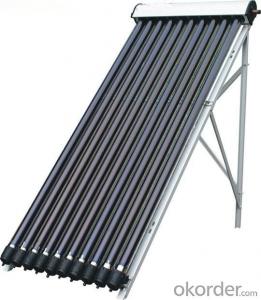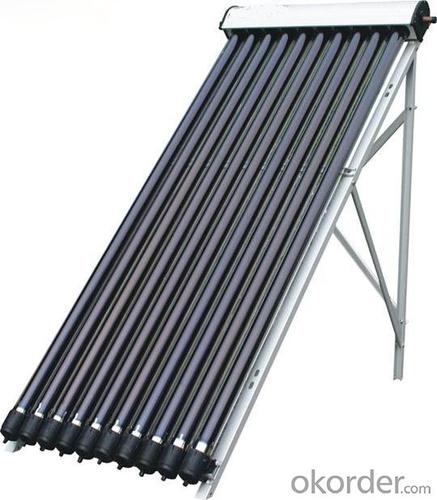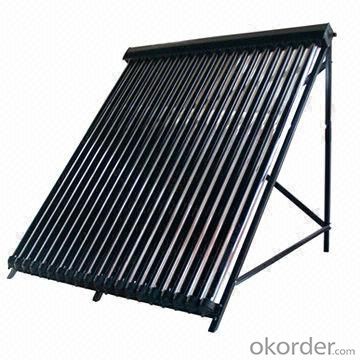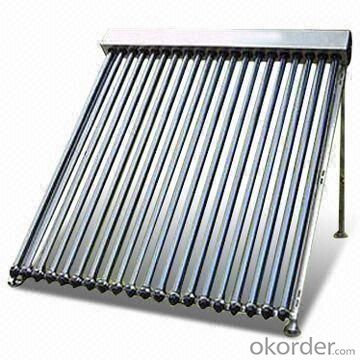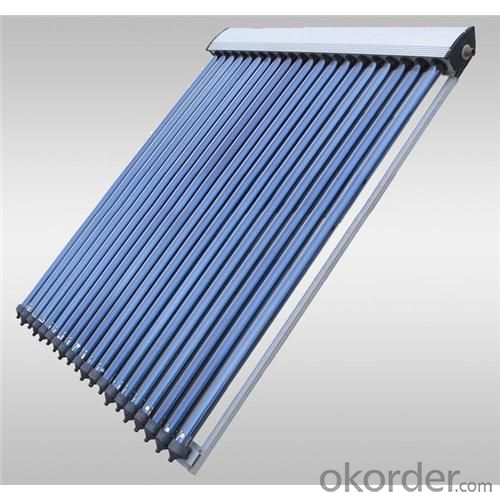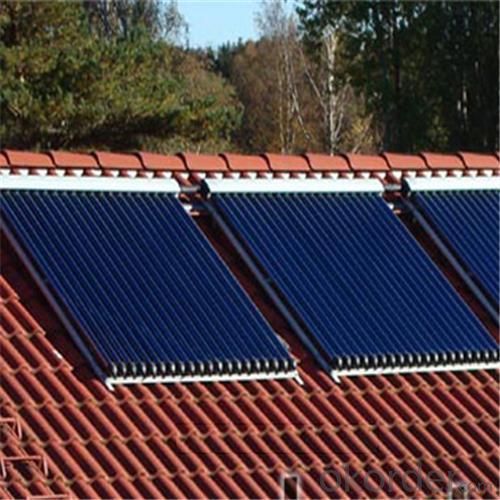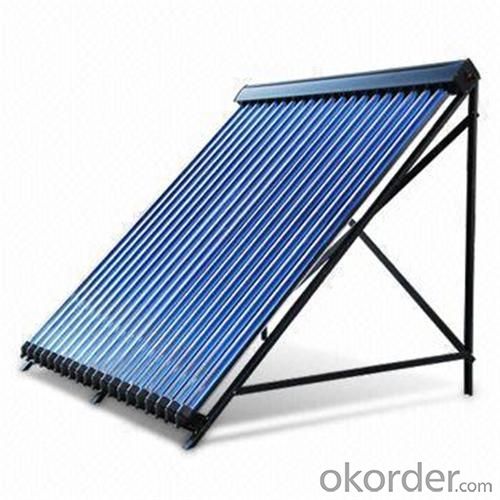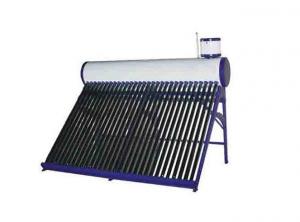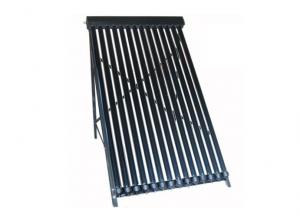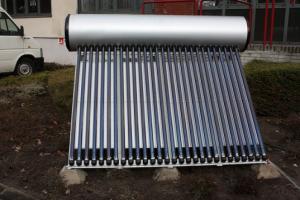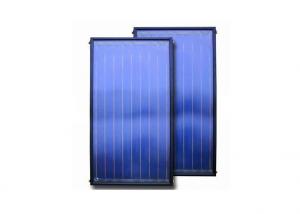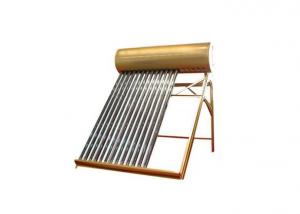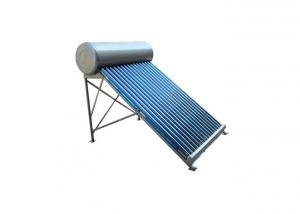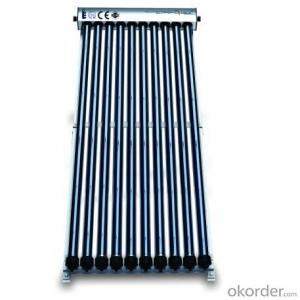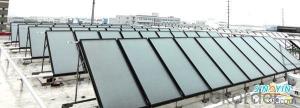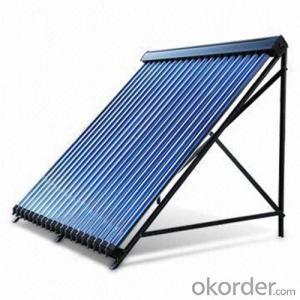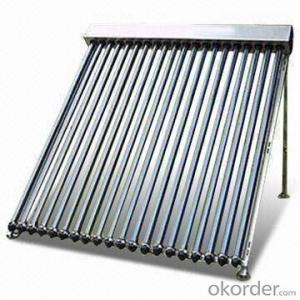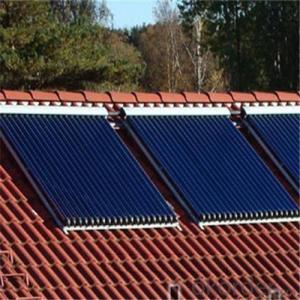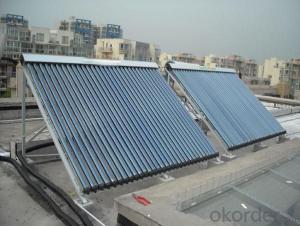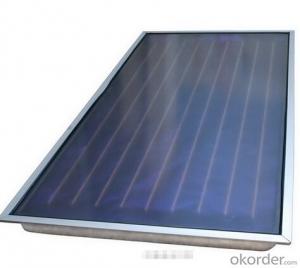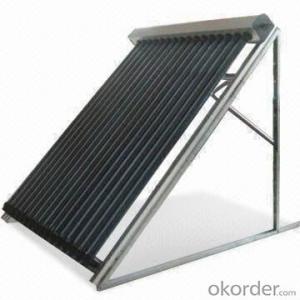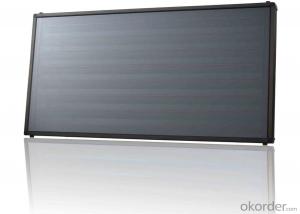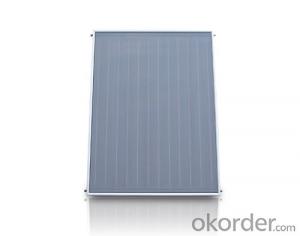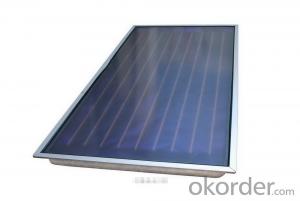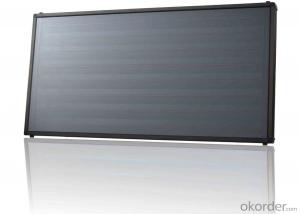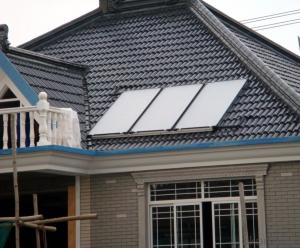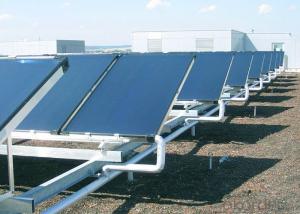Liquid Solar Collectors - Heat Pipes Solar Collectors for Rooftop with ROHS Certificate
- Loading Port:
- China main port
- Payment Terms:
- TT OR LC
- Min Order Qty:
- 5 set
- Supply Capability:
- 10000 set/month
OKorder Service Pledge
OKorder Financial Service
You Might Also Like
Specifications
manifold (inner) | red copper |
manifold (exterior) | aluminum alloy |
glass tube dimensions | 58mm * 1800mm |
daily efficiency | ≥55% |
heat preservation | 72 hours |
hail resistance | 25mm |
max pressure | 7 bar |
coating of vacuum tube | ALN/AIN-SS/CU |
heat pipe | anti-freezing > -35 degree |
certificate | Solar Keymark, EN12975,SRCC |
Serious Product
Models | L*W*H mm | Vacuum tube | Power output | Efficiency | Header mm | Frame | container loading 20FT/40HQ sets | Gross Weight kg |
SHC-8 | 1917*910*133 | 58*1800*8pcs | 939W | 0.668 | Φ35/1.0 | AL alloy | 185/445 | 27 |
SHC-10 | 1917*1130*133 | 58*1800*10pcs | 1189W | 159/385 | 33 | |||
SHC-12 | 1917*1350*133 | 58*1800*12pcs | 1440W | 149/358 | 40 | |||
SHC-15 | 1917*1680*133 | 58*1800*15pcs | 1815W | 120/290 | 49 | |||
SHC-18 | 1917*2010*133 | 58*1800*18pcs | 2191W | 100/242 | 59 | |||
SHC-20 | 1917*2230*133 | 58*1800*20pcs | 2442W | 87/210 | 66 | |||
SHC-22 | 1917*2450*133 | 58*1800*22pcs | 2692W | 83/202 | 72 | |||
SHC-24 | 1917*2670*133 | 58*1800*24pcs | 2943W | 77/188 | 79 |
Packaging & Delivery
Packaging Details: | Exporting Carton with big foaming protection |
Delivery Detail: | In 10-15 days |
Loading Quantity
Model | Tube | Tube Q.T.Y | Loading Q.T.Y/40HQ |
GSC15 | 58*1800mm | 15pcs | 315sets |
GSC18 | 58*1800mm | 18pcs | 265sets |
GSC20 | 58*1800mm | 20pcs | 248sets |
GSC22 | 58*1800mm | 22pcs | 225sets |
GSC25 | 58*1800mm | 25pcs | 200sets |
GSC30 | 58*1800mm | 30pcs | 168sets |
Principle of solar collector:
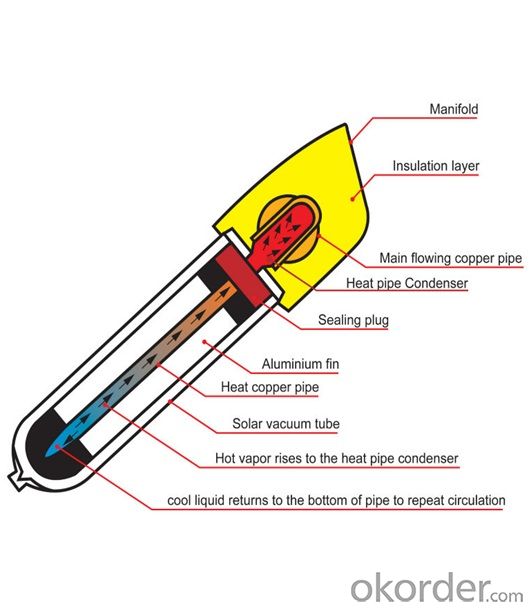
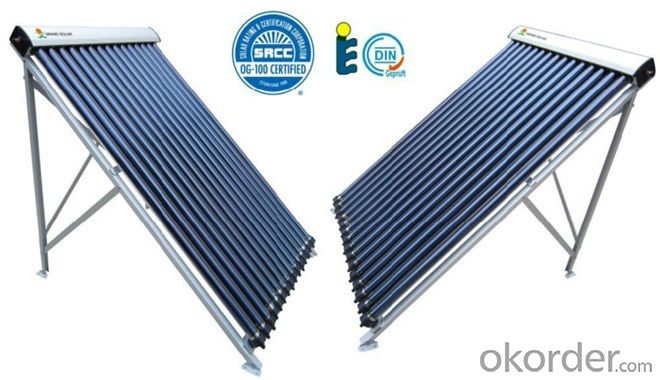
Solar collector details
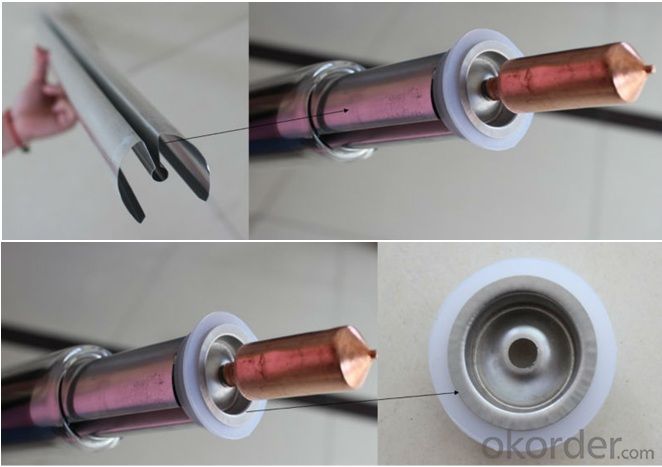
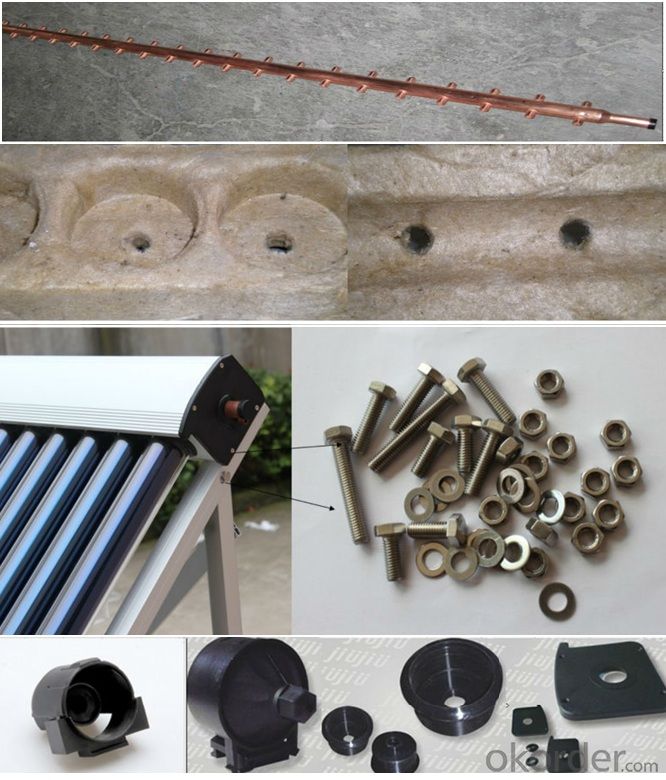
- Q: Are there any limitations to the angle of installation for solar collectors?
- Yes, there are limitations to the angle of installation for solar collectors. The optimal angle for solar collectors depends on the latitude of the installation location and the time of year. In general, solar collectors should be installed at an angle that maximizes the amount of sunlight they receive throughout the year. In locations closer to the equator, where the sun is higher in the sky year-round, solar collectors are typically installed at a steeper angle, usually around 30 to 40 degrees. This allows for maximum solar radiation absorption throughout the day. In areas farther from the equator, where the sun's angle changes significantly throughout the year, solar collectors are often installed at a shallower angle. This helps to optimize solar energy absorption during the winter months when the sun is lower in the sky. However, there are limitations to the angle of installation. If the angle is too steep or too shallow, it can result in reduced energy production. Steeper angles may cause snow or debris to accumulate on the solar panels, hindering their efficiency. Shallower angles may result in less solar radiation absorption, especially during the winter months. Other factors that may limit the angle of installation include space constraints, structural limitations, and aesthetic considerations. In some cases, the angle of installation may need to be adjusted to accommodate these factors, even if it is not optimal for maximum energy production. Overall, while there are limitations to the angle of installation for solar collectors, careful consideration of the location, time of year, and other factors can help ensure maximum energy production and efficiency.
- Q: Can solar collectors be used in boats?
- Yes, solar collectors can be used in boats. They are an efficient and sustainable way to generate electricity on board, providing power for various applications such as lighting, navigation systems, and charging batteries. This renewable energy source is particularly advantageous for boats due to their exposure to sunlight and the potential for long hours of uninterrupted solar energy collection. Additionally, solar collectors are lightweight and easy to install, making them a practical choice for marine vessels.
- Q: Are there any challenges in integrating solar collectors with existing plumbing systems?
- Yes, there can be challenges in integrating solar collectors with existing plumbing systems. One of the main challenges is ensuring compatibility between the solar collector system and the plumbing system. This may require making modifications or upgrades to the existing plumbing infrastructure. Additionally, the installation process may involve complex pipework and require professional expertise. Proper sizing and positioning of the solar collectors is also crucial to maximize efficiency and ensure optimal integration.
- Q: What are the benefits of using solar collectors?
- Solar collectors have several benefits, including reducing electricity costs, decreasing reliance on fossil fuels, and promoting renewable energy sources. They harness the sun's energy to generate heat or electricity, making them environmentally friendly and sustainable. Additionally, solar collectors require minimal maintenance, have a long lifespan, and can even generate excess energy that can be sold back to the grid.
- Q: Can solar collectors be used in agricultural applications?
- Yes, solar collectors can be used in agricultural applications. They can be utilized to power irrigation systems, provide heat for greenhouses, or generate electricity for various farming operations. Solar energy offers a sustainable and cost-effective alternative to traditional energy sources in agriculture, promoting the use of renewable resources and reducing carbon emissions.
- Q: Can solar collectors be used for heating restaurants and food service establishments?
- Yes, solar collectors can be used for heating restaurants and food service establishments. Solar thermal systems can efficiently capture and convert sunlight into heat energy, which can then be used for various heating applications, including space heating, water heating, and even heating for cooking processes in commercial kitchens. By utilizing solar collectors, restaurants and food service establishments can significantly reduce their reliance on traditional fossil fuel-based heating systems, leading to cost savings and a more sustainable operation.
- Q: Are there any aesthetic considerations when installing solar collectors?
- Yes, there are aesthetic considerations when installing solar collectors. The design and placement of the solar collectors should be in harmony with the overall aesthetics of the building or property. Considerations such as the color, size, and shape of the collectors should be taken into account to ensure they blend seamlessly with the existing architecture and landscape.
- Q: Can solar collectors be used for heating car rental facilities?
- Yes, solar collectors can be used for heating car rental facilities. Solar thermal systems can provide a sustainable and cost-effective solution for heating the facilities by harnessing the sun's energy to generate heat. This can reduce the reliance on traditional heating systems and lower energy costs, making it an environmentally friendly option for car rental businesses.
- Q: How do solar collectors perform during winter months?
- Solar collectors can still perform well during winter months, although their efficiency may be slightly reduced compared to the summer months. The performance of solar collectors during winter is influenced by several factors. Firstly, the angle and orientation of the solar collectors play a significant role. In winter, the sun is lower in the sky and the days are shorter, so it is important to have the collectors at an optimal angle and facing south to maximize their exposure to sunlight. Adjusting the angle of the collectors can help capture more sunlight during the shorter winter days. Secondly, weather conditions can affect the performance of solar collectors. Cloudy or overcast days can reduce the amount of sunlight reaching the collectors, which in turn affects their efficiency. However, even on cloudy days, solar collectors can still generate some heat, albeit at a lower rate. Thirdly, the ambient temperature also impacts the performance of solar collectors. Cold temperatures can affect the heat transfer from the collectors to the heat transfer fluid or to the storage system. Insulation and proper design of the collectors and piping systems can help mitigate heat losses and maintain efficiency during winter. Lastly, the usage of a backup heating system can supplement the solar collectors during periods of low sunlight or extreme cold temperatures. This ensures a constant supply of heat even when solar energy is not sufficient. In conclusion, while the performance of solar collectors may be slightly reduced during winter months due to lower sunlight intensity and shorter days, they can still generate heat and contribute to the overall energy savings and sustainability of a building or system. Proper design, orientation, and maintenance can help maximize their efficiency even in colder climates.
- Q: Can solar collectors be used for heating shopping centers?
- Yes, solar collectors can be used for heating shopping centers. Solar thermal systems can be installed on the rooftops or as ground-mounted systems to collect solar energy and convert it into heat. This heat can then be used for space heating and water heating in shopping centers, reducing the reliance on fossil fuels and lowering energy costs.
Send your message to us
Liquid Solar Collectors - Heat Pipes Solar Collectors for Rooftop with ROHS Certificate
- Loading Port:
- China main port
- Payment Terms:
- TT OR LC
- Min Order Qty:
- 5 set
- Supply Capability:
- 10000 set/month
OKorder Service Pledge
OKorder Financial Service
Similar products
Hot products
Hot Searches
Related keywords
